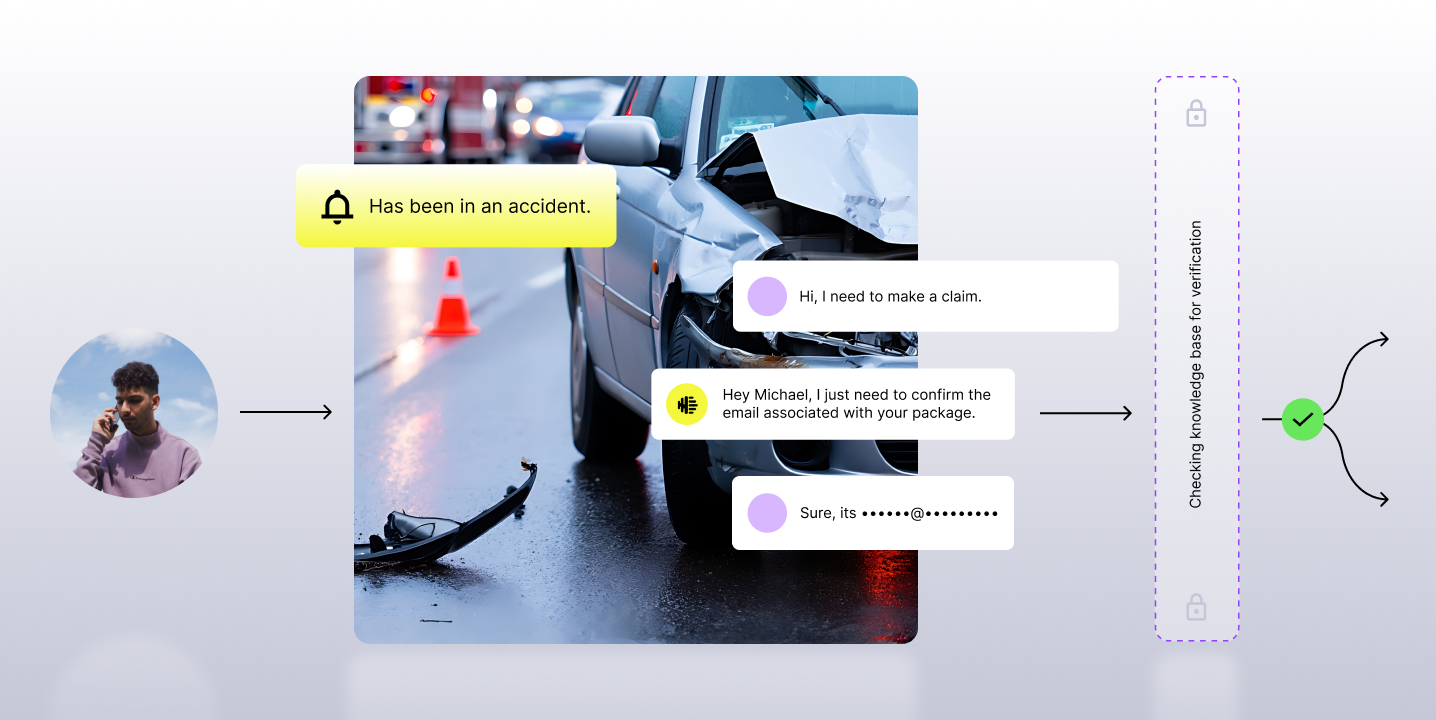What are empathy statements and how do you coach agents on them?
Empathy statements are expressions of understanding and compassion used by agents to show that the customer is being heard and that the customer’s concerns are being addressed.
At their core, empathy statements validate customer feelings. And they’re critically important for call center success.
Why are empathy statements important for call center agents?
Empathy statements are critical for call center agents for a variety of reasons. First and foremost, they have the power to calm angry customers. With the right words, agents can help to defuse tense situations and build rapport between the customer and the representative.
Additionally, empathy statements are a way for call center agents to demonstrate active listening: That means that in addition to addressing the customer’s problem, agents are also listening to the customer’s word choices and tone to identify how the customer is feeling—and the resulting empathy statements demonstrate to the customer that their feelings are being heard.
Deploying empathy statements also involves reflective listening, where the representative paraphrases the customer's concerns to demonstrate that they hear and understand the customer.
At the end of the day, when properly used, empathy statements can help agents provide a superior customer experience. That means the business will be less likely to lose customers and more likely to get repeat business—a win-win for all involved.
As a result, empathy statements are critical for improving a number of important call center KPIs including:
- Customer satisfaction (CSAT): When an agent displays empathy (and the perception of a caring approach), there’s a better chance of the overall sentiment of the call being positive. If a caller is unhappy or frustrated at the start of the call, empathy statements are used to improve the callers mood and impact overall CSAT metrics.
- Supervisor Escalation: It’s estimated that 85% of escalations could have been resolved with the initial phone rep, however, one of the primary drivers of a supervisor escalation is negative caller sentiment. If the caller is frustrated or has a complaint that they feel won't be resolved by the agent, they may immediately opt to request to speak to a supervisor. Empathy statements are a powerful de-escalation tactic, turning around the sentiment on the call and avoid a supervisor escalation by building better rapport with the caller.
- Increased conversions and customer retention: One negative experience can cause a caller to take their business elsewhere and churn. They might be calling in to vent, or looking to have an issue resolved, so by empathetically resolving their issue, you can increase conversion rates and reduce churn.
Examples of empathy statements
Empathy statements are phrases or sentences that show a customer that you understand their feelings and concerns. A few examples would be:
- "That sounds frustrating. Let's see how we can resolve this issue.”
- "Thank you for bringing this to our attention. I can see why this is important."
- “I understand how important this is to you. Let's see what we can do to help."
- “That sounds frustrating. Let's talk more about what's going on and how we can help.”
- “I can see why this is causing you stress. Let's work together to find a solution that works for you.”
The key to using empathy statements is to show that you understand and care about the customer's concerns. By using these types of statements, call center agents can build rapport with customers, calm angry customers, show a willingness to help, and find solutions to the customers’ problems.
Magic vs. Tragic Moments
One of our customers, a large U.S.-based moving company, monitors their agent performance around empathy statements using MAGIC and Tragic moments, a mix of active verbs and personal pronouns.
MAGIC moments are interactions that “Make A Great Impression on the Customer,” such as saying “please” “thank you,” or “How can I help?” Tragic moments, such as saying “Calm down,” “Never,” and “Just a sec,” do the opposite.
While MAGIC moments are empathy statements, think of tragic moments as unempathetic statements.

When do you use empathy statements?
In reality, agents should use empathy statements as often as possible. Taking an empathetic approach puts the agent in a better position to establish rapport, show authenticity, and build trust with the caller.
However, there are certain empathy statements that can be used in important situations, and agents can be coached on those. They include:
- At the beginning and end of the call. This is an opportunity to open the call with a welcoming tone and end the call leaving the caller with a lasting positive experience.
- When the caller expresses their problem or issue they’re having. This is an opportunity for the agent to acknowledge that they understand the problem or challenge. It’s also an opportunity to instill confidence in the caller that the agent will do their best to solve the problem. This shows a genuine interest of the agent in the customer's challenge.
- When the caller’s tone changes and they are upset or frustrated. This is an opportunity for the agent to empathize with the caller, validating their feelings.
- When the caller states something that is true. This is an opportunity for the agent to acknowledge that the caller is correct and validates their point of view.
How can you coach agents for better empathy?
Given the importance of empathy statements, it’s no surprise that organizations would want to coach agents on them. After all, the impact of formal coaching programs is undeniable. According to Observe.AI’s State of the Contact Center Conversation Intelligence 2022 report, 80% of organizations with mostly top-performing agents have a formal coaching process, with nearly 60% saying it’s a top priority.
However, even those organizations with formal coaching programs feel they are falling short when it comes to teaching agents empathy, specifically. A quarter of respondents to our recent Building a Resilient Contact Center report cited agents’ lack of empathy and other critical communication skills as a most pressing concern for their current and future contact center operations.
Luckily, there are a few key ways to help agents hone their empathy skills.
Define empathy and give examples
First things first: Organizations should ensure that agents are crystal clear on what empathy is (and isn’t): Empathy is the ability to understand and relate to the feelings of someone else. It isn’t sympathy, which means feeling sorry for someone. Rather, it’s being able to put yourself in someone else’s shoes and sensing what they’re going through, as well as having compassion for them.
Empathy is the difference between saying, “I can understand how frustrating that must be for you” (empathy) and, “I’m sorry you’re going through this” (sympathy).
To come across most authentic and forget a better connection with customers, agents should practice using personal pronouns (I/you) and include specific references to the customer’s unique situation when possible.
Avoid just saying “sorry”
When an agent apologizes (says "sorry) to a customer, they aren't actually indicating empathy. It's more powerful for the agent to instead of saying "sorry," proactively assure the customer that they are commited to solving their issue.
Here are some examples of how to express empathy without saying sorry:
- "I'm here you solve your issue."
- "I understand why you're feeling that way."
- "I understand why this is difficult."
- “I would like to do _____ for you.”
- "I will personally take care of this for you."
Convey authenticity
Coming across as genuine is crucial for agents to be successful. To that end, agents should strive to use a friendly and natural tone during their interactions with customers. While they should be sure to tick off the necessary script items and use preferred language, they agents should avoid sounding scripted or robotic—rather, they should sound like a real person.
Beyond that, agents can express authenticity by:
- Being transparent and honest about what they can and can’t do for the customer. They should not make promises they can’t keep. Agents should alert customers to any limitations or restrictions upfront.
- Providing personalized solutions. Agents should base solutions on each customer's specific needs and situation.
- Using the customer’s name (pronounced properly!) during a conversation. This helps to personalize the interaction and makes the customer feel valued and respected.
- Following through. Agents should make sure they circle back and follow through on any promises or to-do items that come up during the interaction. This demonstrates reliability and helps to build trust with the customer.
- Expressing gratitude. Agents should thank customers for their business and for taking the time to contact the company. This shows appreciation for the customer and reinforces the idea that the customer's satisfaction is important to the company.
Practice active listening
Active listening is a communication technique used by call center agents to understand and respond effectively to customer needs and concerns. It involves paying full attention to what the customer is saying and providing appropriate responses that show understanding and empathy.
Active listening generally involves 5 steps:
- Paying attention: Call center agents should focus their attention on the customer and avoid distractions such as background noise or multitasking.
- Verifying understanding: Agents should ask clarifying questions and summarize what the customer has said to ensure the agent has understood the issue correctly.
- Providing feedback: Agents should provide feedback to the customer to show they are listening, understand the customer’s concerns, and support the customer. For example, the agent could say, “I understand how frustrating that must be for you.”
- Empathizing: Agents should show empathy for the customer's situation and acknowledge their feelings. This helps to build rapport and trust.
- Responding appropriately: Agents should respond appropriately to the customer's concerns, offering solutions or assistance that meet their needs.
Role play
This coaching technique simulates real-life scenarios that call center agents may encounter during their interactions with customers. It involves creating a fictional scenario and assigning roles to the agent and a trainer or colleague who acts as the customer. The agent then practices their communication skills and problem-solving abilities in a safe and controlled environment.
Role-playing can help agents practice active listening, effectively deliver empathy statements, and problem-solve, as well as hone communication skills and build confidence.
How AI can help monitor and coach for empathy
There are several ways AI can help call centers monitor and coach their agents on empathy.
First, automated QA processes can give you visibility into 100% of your conversations so you can better understand what’s actually happening on the front line. When you get the speech analytics you need from that data, you can provide more personalized agent coaching and make better business decisions across the board, from marketing to operations to logistics.
This will allow you to:
- Identify top-performing sales behaviors and scripts faster
- Quickly identify typical objections and questions
- Surface common cross- and upsell opportunities
By uncovering sentiment on 100% of voice calls, contact centers can better understand what’s impacting the candidate experience, identifying opportunities to improve agent soft skills and productivity, and bolster their overall QM strategy.
How Observe.AI can help
Observe.AI was purpose-built to help agents perform their best—including when it comes to empathy statements.
For example, Observe.AI’s Auto QA feature enables organizations to review 100% of calls to identify key areas for improvement. In addition, Real-Time AI delivers in-the-moment guidance to agents to help them through challenging conversations and serve up effective empathy statements.
See it in action. Get a demo.

.png)















